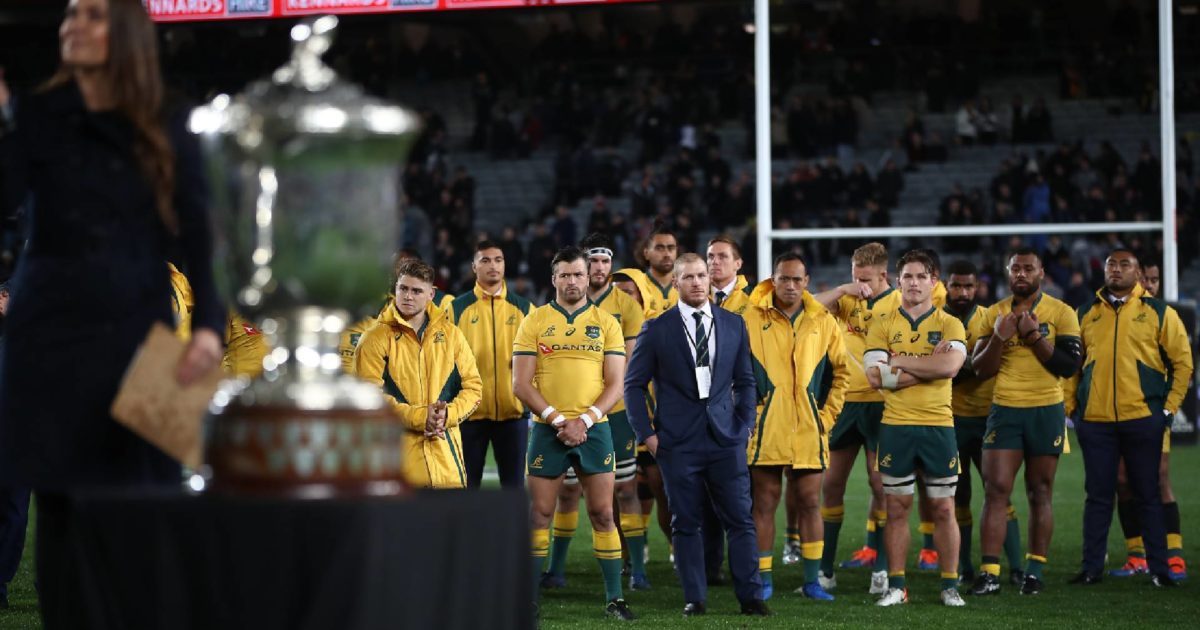Dave Rennie is fantastically good for rugby and the rivalry we need to exist between the All Blacks and Wallabies

Thank goodness for Dave Rennie.
A few New Zealand rugby folk have looked in need of a good cuddle in recent days. News that Australia would host (at least in theory) The Rugby Championship saw plenty of lips drop in these parts.
Fans, be they in charge of keyboards or not, felt a bit let down by politicians and administrators and wondered aloud about how rugby life could be so unfair.
Stories also surfaced that some key All Blacks might have to sit some of the test schedule out for personal reasons, further cementing the view that 2020 simply isn’t our year.
Just as well Dave’s done a job for us, then.
Yes, new Australia coach Dave Rennie has injected a bit of light amid the gloom, by completely dismissing New Zealand Rugby (NZR) and their plans while also having a subtle dig at would-be All Blacks’ captain Sam Cane.
Rennie is nobody’s fool. An immensely clever man, who’s never been afraid to articulate his thoughts, the former Wellington, New Zealand under-20 and Chiefs coach has suddenly made this year’s Bledisloe Cup series more compelling.
We always knew Australia would be more competitive under Rennie’s watch. Maybe not this year, but definitely by the time the next Rugby World Cup rolled around.
Far from waiting for 2023, though, thanks to Rennie I now can’t wait for 2020’s games to start.
It appears as if the All Blacks will host the Wallabies in back-to-back tests on October 17 and 24. That would present some logistical problems for Rennie and his squad, around how many of the players can train together without contravening this country’s quarantine protocols.
Far from lapsing into the usual coach-speak about how he’ll adapt to those conditions or try to control the controllables, Rennie has simply said the restrictions were “unacceptable’’ and that the Wallabies wouldn’t be playing under those circumstances.
It’s hard to know quite why Rennie isn’t coaching New Zealand rather than Australia. Among the New Zealand-coaching diaspora, it’s arguable whether there’s anyone as well-credentialed as him.
But, for whatever reason, Rennie didn’t appear valued here. He was said to be too blunt for some, too ready to fight the Chiefs’ corner. When the expectation was that all Super Rugby coaches would simply fall into line with every All Blacks-dictate, Rennie would do and say otherwise.
https://www.instagram.com/p/CFLV8X9B5gP/
Coaches aren’t dim. Well, the good ones at least. They know exactly what’s for public consumption and what’s not and what messages they want sent or reinforced by what they say and how those words are likely to be reported and interpreted.
For that reason, elite rugby coaches are never misquoted or misconstrued because they’re the ones controlling the narrative.
Rennie hasn’t been in Australia long, but he’s quickly adopted a tactic that’s been a staple of their test cricket team.
Undermine the opposition captain, so the theory goes, and you go a long way to beating his team. Preferably with the ball, but often verbally too, you batter the other skipper. Rough him up, then nick him out and you diminish his stature within his own side.
So when Dave Rennie expressed his great admiration for Chiefs flanker Lachlan Boshier and surprise that he was not in the All Blacks’ squad, was he actually praising Boshier? Or was it actually an attempt to exert a bit of pressure on Cane?
We’ll know better as time goes on but, as mentioned earlier, Rennie is no fool. He knows that Ian Foster wasn’t a unanimous choice as All Blacks coach, nor Cane as his captain.
You hit the opposition where they’re potentially vulnerable and, the truth is, the jury remains out on Foster, just as questions remain about Cane. Rennie would be remiss if he didn’t hint at those and try to exploit them.
All of which is fantastically good for rugby and the rivalry we need to exist between the All Blacks and Wallabies.
We assume The Rugby Championship will go ahead as scheduled, but that’s not a given. Even if it does, with no rugby being played in South Africa, we have no idea what the Springboks might be like this year, while Argentina have a genuine COVID-19 outbreak in the camp. The All Blacks don’t appear destined for the northern hemisphere anytime soon, so strong competition from Australia is critical to the health of rugby here.
I’ll admit to having been a little disinterested in this year’s Bledisloe Cup series. A bit sceptical about the strength in depth of Australian rugby and the chances of a competitive Wallabies’ side being cobbled together.
Now, thanks to Rennie, I can’t wait to see the two teams meet. Can’t wait to see the games he plays with the New Zealand media and the way he potentially gets into a few All Blacks’ heads.
It’ll be all on if the Wallabies can actually win a game or two.
































































